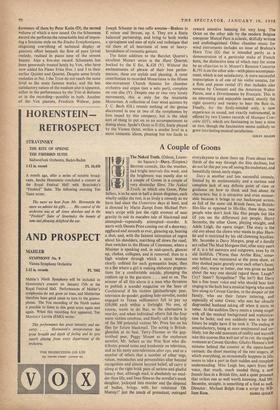A Couple of Goons
ter Square.)—Davy. (Empire.)
0 The Naked Truth. (Odeon, Leices- had bright intervals this week, and the brightness was mostly due to a couple of Goons in a couple of BRITISH comedy, like the weather, 0 very dissimilar films. The Naked g
Truth, in which one Goon, Peter Sellers, is to be seen in half a dozen disguises, each wholly unlike the rest, is as lively a comedy as we have had since the Genevieve days at least, and is directed by Mario Zampi from Michael Pert- wee's script with just the right amount of neat gravity to suit its macabre tale of blackmail and attempted—repeatedly attempted—murder. It starts with Dennis Price coming out of a doorway, eggfaced and smooth as ever, glancing up, hearing a shot, and, with the faintest intimation of regret about his shoulders, marching off down the road; then switches to the House of Commons, where a Minister is speaking and, in mid-speech, glances up, chokes, collapses, and is removed; then to a high window through which a stout woman clearly unfitted for such gymnastics leaps; then to a flat where a girl is making elaborate prepara- tions for a comfortable suicide, plumping the cushion up in the gas-stove . . . and so on. The arouser of all this alarm is a man who threatens to publish a scandal magazine on the lines of Confidential if his victims (philanthropic peer, television do-gooder, gushing lady-novelist, model engaged to Texan millionaire) fail to pay up £10,000 each within a fortnight. No one, of course, wants to do that, so the alternative is murder, and when individual efforts fail the four main victims combine, and finally call in the help of the 300 potential victims Mr. Price has on his files for future blackmail. The acting is British- ghoulish at its best. Terry-Thomas as the gap- toothed peer, Peggy Mount as the exuberant novelist, Mr. Sellers as the Wee Scot who dis- tributes pound notes and bonhomie on television, and as his nasty non-television alter ego, and as a number of others that a number of other wigs, voices, moustaches and personalities alter beyond recognition and almost beyond belief, all carry it along at the right brisk pace of serious and gleeful lunacy that, although mad, is absolutely no mad- der than life, and Joan Sims as the novelist's meek daughter, jockeyed into murder and Ole disposal of bodies, brings, with her reiterated 'Oh Mumsy!' just the touch of protestant, outraged everydayness to show them up. From about two- thirds of the way through the film declines, but do not let this put you off seeing the exuberant, and beautifully timed, early stages.
Davy is another and less successful comedy, limited by its sentimentality and a curious and complete lack of any definite point of view or guidance on how to think and feel about its characters; but it is attractive and even memor- able because it brings to our hackneyed screen, so full of the same old British faces, so British- film-like as opposed to life-like, these days, two people who don't look like film people but like (if you see the difference) just people; Harry Secombe, the other Goon, playing straight, and Adele Leigh, the opera singer. The story is the old one about the clown who wants to play Ham- let and is restricted by his old clowning loyalties. Mr. Secombe is Davy Morgan, prop of a family act called The Mad Morgans that, after sixty years of it, is a bit outworn and outgrown, even by its old faithfuls. Morse than Archie Rice,' some- one behind me murmured at the press show, as they sloshed paint gravely over each other's faces; only that, worse or better, one was given no lead about the way one should regard them. Laugh? Cry? Sneer? Sympathise? The lot?) But Davy has a fine tenor voice and who should hear him singing in the bath but a musical bigwig who sends him along to Covent Garden, to the despair of the family, who see their future tottering, and especially of sister Gwen, who sees her already disgruntled husband taking off when it starts to totter. At the audition Davy meets a young singer with all the musical background and sophistica- tion he lacks; and one suddenly sees in her the future he might have if he took it. The ending is unsatisfactory, being at once sentimental and un- likely, but the odd moments of reality and warmth take this uneven film well out of its rut: the singing moments at Covent Garden; Gladys Henson's feW minutes behind the counter at the opera-house canteen; the short meeting of the two singers, in which everything, as occasionally happens in life, seems to take a part in their sudden and complete understanding. Miss Leigh has, apart from her voice, that much, much needed thing, a neW female face in a British film, and a quiet presence that strikes one as well worth knowing. And Mr. Secombe, straight, is something of a find as well Director : Michael Relph from a script by Wil-


































 Previous page
Previous page